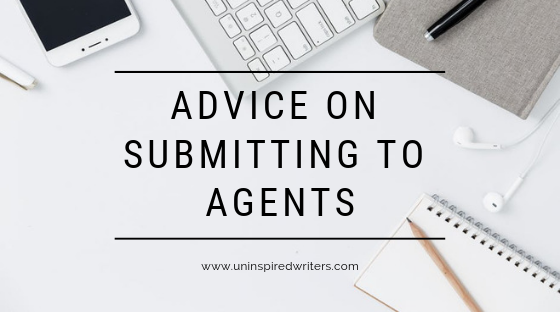Morning world builders, I hope you’ve all had a great week.
Last Sunday I sent of my first ever submissions. I sent my carefully crafted work out into the world, and now I am up against the long wait for inevitable rejections and potential feedback.
It’s taken a long time to reach this point and I’ve needed to do a lot of research, and seek a lot of help, to get here. So I want to share with you some of the advice that has helped me, and some of the things I’ve learned. Please share your advice in the comments, as there’s still plenty I don’t know.
1. Make sure your novel is finished
This is the first advice you’ll see anywhere. It’s really tempting, when you’ve had an amazing idea, to pitch it before it’s ready. But the truth us, most agents want to hear from writers who have finished their work. And not just finished the first draft either. But edited, and revised, and rewritten until it’s at the best standard that it can be. If you’re unsure you can always send it to beta readers, to find out if there’s anything missing, anything it lacks or any parts that are confusing.
Of course, you do also need to allow yourself to say “it’s done.” As a writer, you may seek perfection and think that your novel will never be at that point, but that’s not it. You must reach a point where you tell yourself, “I have done all I can for now. It is done.”
2. Write a cover letter and synopsis
I really, really hated synopsis writing. It was horrible. I didn’t enjoy it at all. And so I sought a lot of online advice, which I’m going to share with you.
First of all was the Agent Submission Pack at Jericho Writers. This pack is free to download, and comes with a step by step guide on writing both your cover letter and your synopsis. Now, you’ll need to adapt your cover letter to suit each individual agent; they aren’t clones, so why should your letter be? But the basis of the letter can, of course, be the same, and this is what the submission pack aims to do.
{Edit Note: It seems the submission pack is no longer available for free download, but the templates and examples are available here for the synopsis and here for the query letter}
Next, I attended a writing event. This day was full of information and insight, from authors, agents and publishers and they all shared tips for submissions. These tips included:
- Start your synopsis by writing a one sentence summary of the setting of concept. Then branch out into the central character, the inciting incident and the conflicts. Keep branching out until you have told the whole story, but condensed.
- Try writing a 300 word synopsis, because this is really tricky, but will keep it concise. Then you can expand from there to the number of words/pages your chosen agent requests.
- The synopsis should have an emotional thread, not just talk about what happens, but why it happens – include character motives.
- A synopsis should include spoilers, and not just be a vague blurb style piece.
You don’t have to go to a writing event to gather this information, but it can be really helpful, especially if agents you want to pitch to are attending. They will share an in depth view of their preferences, which can help you build your submission.
3. Do your research
It’s another central piece of advice. Do your research. Because sending to the wrong agent for your story is a waste of time for you and for them. You are, in your quest for an agent, trying to find the perfect fit. That means they have to fit with you, and you with them. So find out what their preferences are, who they are as people, what they enjoy. One way that I do this, is look for interviews with that agent. You’ll be amazed at how many online interviews they’ve done, and you can find out a lot more about what they like and what they’re looking for.
Submitting to an agent isn’t something you do on a whim, so don’t treat it as such. But in the time and effort, and then see what happens.
4. Don’t be disheartened
Another thing I learnt at the writing event, was that a lot of the time, finding an agent is all about timing. You may not be the right match for them at that time, but that doesn’t mean you never will be. In fact one agent explained how she had come back to a writer a couple of years later, and managed to get a book deal for the same book that was previously unsuccessful. Simply because it was better timing.
It also so important to understand that all opinions are subjective. A rejection is not somebody saying your novel isn’t good enough to be published. It’s just them saying it isn’t right for them. Never give up! I only sent mine out a week ago, so I’ve not had a rejection yet, but I know it is inevitable. The best thing to do is be prepared, don’t be disheartened, and carry on.
As I said above, I am new to this submission stage, and still have loads to learn. If you’ve any advice please do comment below or message me. I’d be so grateful.
Until then,
Keep writing/editing/submitting,
M
x
I talk more about my journey on Facebook, Twitter & Instagram






Great tips, M! Congrats on reaching such a huge milestone. One tip that has always stuck with me is to work on something you love while you’re waiting to hear back (working on my 4th book kept me going while the 1st was being rejected over and over again). And to have your next submission ready to go so that you can send it off as soon as you get a rejection. Kinda like marking off a checklist and moving straight onto the next task. Also, grieve if you want to, there’s nothing wrong with it, but get back into submitting as soon as you can. Wishing you the best of luck. You have such a great MS and the world deserves to read it 😊❤️.
LikeLiked by 2 people
Thanks so much! Your tips are amazing too ❤ I am working on plotting novel 2, while I wait, which gives me something to stay excited about and keeps me writing. I like your advice about having the next submissions ready though, and will definitely do that. ❤ xx
LikeLiked by 1 person
😊
LikeLike
Well done!!!
I was told to send to 5 agents to begin with, and adjust your submission package as necessary before sending out again.
Great post, I’m going to download the submission package and adjust my synopsis. Thanks
LikeLiked by 1 person
Yes, that’s great advice, Rainy, advice I’m following/will continue to follow. Hope the submission pack is useful 🙂 x
LikeLiked by 1 person
Reblogged this on Chris The Story Reading Ape's Blog.
LikeLiked by 1 person
Thank you 🙂
LikeLiked by 1 person
Welcome, ML 😃
LikeLike
Reblogged this on When Angels Fly.
LikeLiked by 1 person
Thank you 😀
LikeLiked by 1 person
Welcome!
LikeLike
Reblogged this on Susan A. Royal and commented:
Good advice!
LikeLiked by 1 person
Thank you 🙂 x
LikeLike
Great advice and insights thanks – I’m drawing out the final stages of editing maybe cause the whole ending it scares me a little but this all seems step by step do-able plus I like the idea of working on something fun and anticipating! Thanks 🙏🏻 and best of luck xx
LikeLiked by 1 person
Thanks, lovely, best of luck to you too! 🙂
LikeLiked by 1 person
thanks 🌸
LikeLike
Congratulations on reaching this milestone. You set a great example of doing a writer’s homework. Writer’s Digest website and annual Writer’s Guide has lots of good and up-to-date info on agents. Pay attention to the agent’s interests: Is she seeking memoir and chick-lit but not YA? Then don’t send her YA, no matter how great you think your novel is. Look for examples of query letters that worked. Study them carefully. Good luck!
LikeLiked by 1 person
Thanks so much 🙂
You’re so right, research into what agents want is key! x
LikeLike
Reblogged this on Campbells World.
LikeLiked by 1 person
Thank you 😀
LikeLike
Great tips. I’d add to make sure to keep track of where and when you are submitting. I had a spreadsheet running for my first book submission and easily had fifty names on it by the end. That also helped for when my book was picked up, and I needed to notify the agents and publishers that I hadn’t gotten an answer from yet. Key lesson, if an agent doesn’t specifically refuse simultaneous submissions, you should be sending to several at once.
LikeLiked by 2 people
Great tips to mention! I have mine in a spreadsheet too, to keep track of not only who I’ve sent to, but what date I can count it as a “no-reply rejection” and move onto others. 🙂
LikeLiked by 1 person
Good luck with your submissions!
LikeLike
Some excellent, practical advice here. Many thanks for sharing and good luck with the process!
LikeLiked by 1 person
Thanks so much 🙂 x
LikeLike
Great list. You are right, it is all about timing.
Another thing you may want to try: Make sure the first page of your book is closely matched to your query/cover letter. The agent will have that fresh in their mind and when they read the first page of your book they will make a connection.
LikeLiked by 1 person
Great tip Bryan! Thanks for sharing 😀 x
LikeLiked by 1 person
Thanks, this article was really helpful!
I’m especially interested in the agent submission pack you recommended. You said it was a free download, but when I go to the link you provided, I only seem to see a cost of ~$300 for the various services. Can you point me to the specific download or am I somehow missing it on that page?
LikeLike
So glad it was helpful! I am looking at the link now, and you’re right. I can’t seem to find the free download, so maybe they’ve stopped? But I’ve found the same advice/templates for these downloads here: https://jerichowriters.com/synopsis/ and here https://jerichowriters.com/literary-agent-query-letter/
Hope that helps 🙂
LikeLike
Great tips! I love the advice about attending a writing event, both helpful and fun. I plan to take your advice for sure! 🙂
LikeLiked by 1 person
Thanks so much 🙂 ❤
LikeLike
I haven’t even thought about sending to an agent yet. Maybe it’s time. Thanks for this.
LikeLiked by 1 person
Glad it could help 🙂
LikeLike
Thanks for linking to my post 🙂
LikeLike